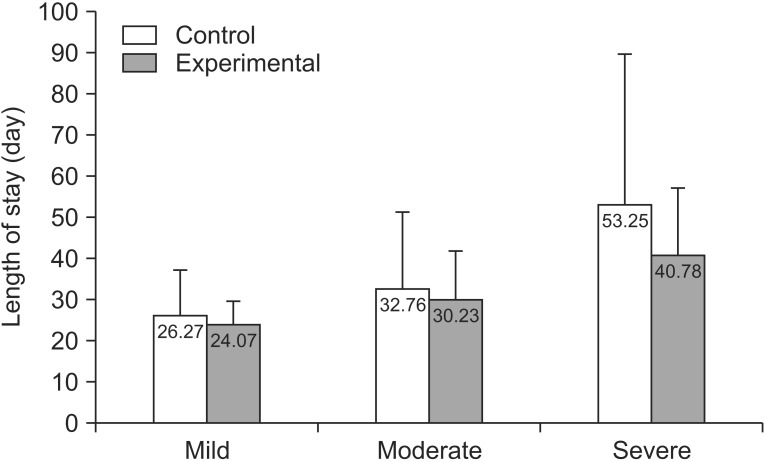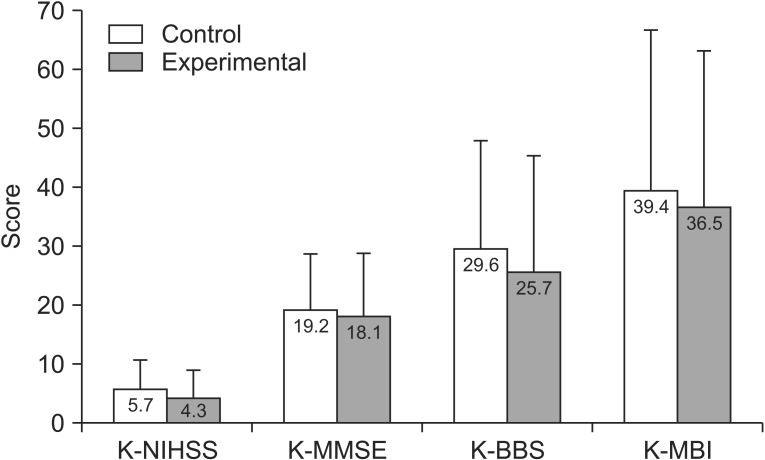Ann Rehabil Med.
2017 Feb;41(1):16-24. 10.5535/arm.2017.41.1.16.
Effect of a Caregiver's Education Program on Stroke Rehabilitation
- Affiliations
-
- 1Department of Physical and Rehabilitation Medicine, Inha University School of Medicine, Incheon, Korea. rmjung@inha.ac.kr
- KMID: 2383673
- DOI: http://doi.org/10.5535/arm.2017.41.1.16
Abstract
OBJECTIVE
To evaluate effects of caregiver's education program on their satisfaction, as well as patient functional recovery, performed in addition to daily conventional rehabilitation treatment.
METHODS
Three hundred eleven subjects diagnosed with first-onset stroke and transferred to the Department of Physical Medicine and Rehabilitation of Inha University Hospital were surveyed. In 2015, caregivers attended an education program for acute and subacute stroke patients. Patients who received an additional rehabilitation therapy were assigned to the experimental group (n=81), whereas the control group (n=100) consisted of transfer cases in 2014 with only conventional treatment. The experimental group was classified by severity using the Korean version of the National Institutes of Health Stroke Scale (K-NIHSS), which was administered to all 181 subjects, in addition to, the Korean version of the Mini Mental Status Examination (K-MMSE), a Modified Barthel Index (K-MBI), and the Berg Balance Scale (K-BBS). Caregiver satisfaction and burden before and after education programs were assessed using the Canadian Occupational Performance Measure (COPM), as well as family burden and caregiver burnout scales.
RESULTS
No significant intergroup difference was observed between initial K-NIHSS, K-MMSE, K-BBS, K-MBI scores, and times from admission to transfer. Those with moderate or severe strokes under the experimental condition showed a more significant improvement than the control group as determined by the K-NIHSS and K-BBS, as well as tendential K-MMSE and K-MBI score increases. Satisfaction was significantly greater for family members and formal caregivers of patients with strokes of moderate severity in the experimental group.
CONCLUSION
The caregiver's education program for stroke subjects had a positive outcome on patients' functional improvement and caregiver satisfaction. The authors believe that the additional rehabilitation therapy with the education program aids patients to achieve functional improvements for an optimal return to social life.
Keyword
MeSH Terms
Figure
Reference
-
1. Roger VL, Go AS, Lloyd-Jones DM, Adams RJ, Berry JD, Brown TM, et al. Heart disease and stroke statistics. 2011 update: a report from the American Heart Association. Circulation. 2011; 123:e18–e209. PMID: 21160056.2. Andersen HE, Eriksen K, Brown A, Schultz-Larsen K, Forchhammer BH. Follow-up services for stroke survivors after hospital discharge: a randomized control study. Clin Rehabil. 2002; 16:593–603. PMID: 12392333.3. Miller EL, Murray L, Richards L, Zorowitz RD, Bakas T, Clark P, et al. Comprehensive overview of nursing and interdisciplinary rehabilitation care of the stroke patient: a scientific statement from the American Heart Association. Stroke. 2010; 41:2402–2448. PMID: 20813995.4. Veerbeek JM, van Wegen E, van Peppen R, van der Wees PJ, Hendriks E, Rietberg M, et al. What is the evidence for physical therapy poststroke? A systematic review and meta-analysis. PLoS One. 2014; 9:e87987. PMID: 24505342.
Article5. Van Peppen RP, Kwakkel G, Wood-Dauphinee S, Hendriks HJ, Van der Wees PJ, Dekker J. The impact of physical therapy on functional outcomes after stroke: what's the evidence? Clin Rehabil. 2004; 18:833–862. PMID: 15609840.
Article6. Galvin R, Murphy B, Cusack T, Stokes E. The impact of increased duration of exercise therapy on functional recovery following stroke: what is the evidence? Top Stroke Rehabil. 2008; 15:365–377. PMID: 18782739.7. Kwakkel G, van Peppen R, Wagenaar RC, Wood Dauphinee S, Richards C, Ashburn A, et al. Effects of augmented exercise therapy time after stroke: a metaanalysis. Stroke. 2004; 35:2529–2539. PMID: 15472114.8. Adams HP Jr, Davis PH, Leira EC, Chang KC, Bendixen BH, Clarke WR, et al. Baseline NIH Stroke Scale score strongly predicts outcome after stroke: a report of the Trial of Org 10172 in Acute Stroke Treatment (TOAST). Neurology. 1999; 53:126–131. PMID: 10408548.
Article9. Chenq YH, Rodger S, Polatjko H. Experiences with the COPM and client-centred practice in adult neurorehabilitation in Taiwan. Occup Ther Int. 2002; 9:167–184. PMID: 12921096.10. Suh MH, Oh KS. A study of well-being in caregivers caring for chronically ill family members. J Nurs Acad Soc. 1993; 23:467–486.
Article11. Kim CS, Kim J. The impact of emotional labor on burnout for caregivers of stroke patients. Korean J Occup Health Nurs. 2015; 24:31–38.
Article12. Kwon SY, Hong SE, Kim EJ, Kim CH, Joa KL, Jung HY. Monitoring of functioning status in subjects with chronic stroke in South Korea using WHODAS II. Ann Rehabil Med. 2016; 40:111–119. PMID: 26949677.
Article13. Wade DT, Wood VA, Hewer RL. Recovery after stroke: the first 3 months. J Neurol Neurosurg Psychiatr. 1985; 48:7–13. PMID: 3973623.14. Kalra L, Evans A, Perez I, Melbourn A, Patel A, Knapp M, et al. Training carers of stroke patients: randomised controlled trial. BMJ. 2004; 328:1099. PMID: 15130977.
Article15. Galvin R, Cusack T, O'Grady E, Murphy TB, Stokes E. Family-mediated exercise intervention (FAME): evaluation of a novel form of exercise delivery after stroke. Stroke. 2011; 42:681–686. PMID: 21233462.16. Han KS, Kang ES, Kim HO, Yang MH, Kim SY. Effect of a family education program on the family burden of the stroke. J Korean Acad Psych Mental Health Nurs. 2004; 13:43–50.17. Jung BC. The effects of rehabilitation education program for stroke patients and their family caregivers [master's thesis]. Chungju: Korea National University of Transportation;2014.18. Shyu YI, Chen MC, Chen ST, Wang HP, Shao JH. A family caregiver-oriented discharge planning program for older stroke patients and their family caregivers. J Clin Nurs. 2008; 17:2497–2508. PMID: 18705725.
Article19. Lincoln NB, Parry RH, Vass CD. Randomized, controlled trial to evaluate increased intensity of physiotherapy treatment of arm function after stroke. Stroke. 1999; 30:573–579. PMID: 10066854.
Article20. Bohannon RW. Muscle strength and muscle training after stroke. J Rehabil Med. 2007; 39:14–20. PMID: 17225032.
Article21. Saxena SK, Ng TP, Koh G, Yong D, Fong NP. Is improvement in impaired cognition and depressive symptoms in post-stroke patients associated with recovery in activities of daily living? Acta Neurol Scand. 2007; 115:339–346. PMID: 17489945.
Article22. Sonoda S, Saitoh E, Nagai S, Kawakita M, Kanada Y. Full-time integrated treatment program, a new system for stroke rehabilitation in Japan: comparison with conventional rehabilitation. Am J Phys Med Rehabil. 2004; 83:88–93. PMID: 14758294.23. Kim KH, Nam KW, Lee JS, Choi GY, Im HS, Lim JY, et al. Effects of full-time integrated self upper-extremity training program on functional recovery and length of stay in stroke patients. J Korean Acad Rehabil Med. 2010; 34:417–423.24. Tokunaga M, Sannomiya K, Watanabe S, Nakanishi R, Yamanaga H, Yonemitsu H, et al. Relationship between hospital ranking based on Functional Independence Measure (FIM) efficiency and factors related to rehabilitation system for stroke patients: a study of three hospitals participating in Kumamoto Stroke Liaison Critical Pathway. Jpn J Compr Rehabil Sci. 2012; 3:51–58.
- Full Text Links
- Actions
-
Cited
- CITED
-
- Close
- Share
- Similar articles
-
- Family Caregiver Burden of Stroke Patient
- Effects of Community-based case Management Program on Functional Status and Caregiver Burden of Stroke Patients
- Effects of Video-guided Education for Primary Family-caregivers of Stroke Patients
- The Development and Evaluation of Navigation Program for Caregivers of Stroke Patients Admitted to a Rehabilitation Centers: A Pilot Study
- The Need for Rehabilitation Day Care Program Service of Stroke Survivors



